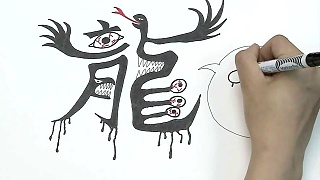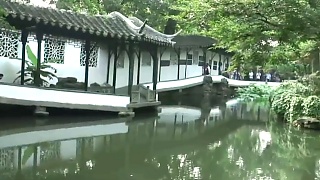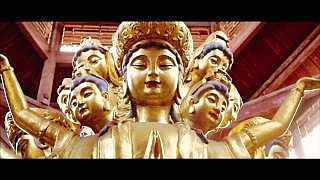These are calligraphy, poetry and music. Chinese Calligraphy Calligraphy is a highly regarded art in China. It is much more than stylised writing in the Western sense of calligraphy and is more akin to painting. Non-depictional and just black and white, line and space, Chinese calligraphy is startlingly beautiful in its simplicity yet enables a very wide range of expression and takes many years to master. Even a Westerner with no experience can sense the beauty of a good example, with its innate sense of balance. And the practice of it requires a harmony of self, brush and paper. Good calligraphy is said to embody the natural forms and movements of the natural world. A popular type of calligraphy involves writing poetry in water outdoors using a large brush on the pavement. Chinese Music Chimes, bells drums and flutes (which could be made quite simply from bamboo), date back into antiquity. Later, by the time of the Tang dynasty (618 - 907) stringed instruments, such as the pipa (similar to the lute) and zither, which are plucked, and the erhu, with its vertically held strings, and Mongolian Horse-Headed Fiddle, which use a bow, were developed. By the Tang dynasty, music - and dance - was widely enjoyed by all people and could be experienced at fairs organised by various temples. Folk songs telling the everyday tales of fishermen, herders and farmers were hugely popular among the peasants. Influences from Buddhism and Islam added further flavour to the repertoire of Chinese music. An interesting variant on the flute is made of clay and is a rounded pot with a number of holes and a spout to blow into. It resembles a small teapot and produces a beautiful sound. Chinese Poetry The 'Book of Songs' (Shi Jing) was the first major collection of Chinese poetry, comprising both aristocratic poems and rustic poetry, probably derived from folk-songs. It comprises 305 poems, some possibly written as early as 1000 BC. The work is one of the 'Five Classics' (Wu Jing), canonized by the Han Dynasty. The poems are said to have been selected and edited by Confucius from a total corpus of about three-thousand poems. Chinese poetry has been influenced by the spiritual traditions of Buddhism and Taoism. The subject is often everyday life, a moment in time, appreciation of nature and a pointing to the underlying unity of life. One of China's most venerated poets is Li Po (AD 701-762) who is also known as Li Bai. Here is an example of his poetry. Visiting a Taoist on TaiTien Mountain Amongst bubbling streams a dog barks;
peach blossom is heavy with dew;
here and there a deer
can be seen in forest glades.
No sound of the mid-day bell
enters this vastness,
where blue mist rises
from bamboo groves;
and from a high peak
hangs a waterfall.
No-one knows where he has gone,
so sadly I rest,
with my back leaning
against a pine.
Related Videos
Featured Videos

|
JiangSu province ...
|

|

|
Geopolitics with Li JingJing, Lee Camp, George Galloway ...
Bonus film with Judge Napolitano and Larry Johnson ...
|

|

|
With Walk East ...
|

|
With Andy see the World ...
|
 The Three Foundations of the Arts
The Three Foundations of the Arts


![How to pronounce the four tones and speak PinYin correctly. With Qing Xia . . . [videogallery type=playlist id=PLn996NprGoEI-rbWdpRlX-yuZoQ5ERZl2 columns=2] Learn to speak Chinese from zero](https://www.beijingbuzzz.com/b101.jpg)








